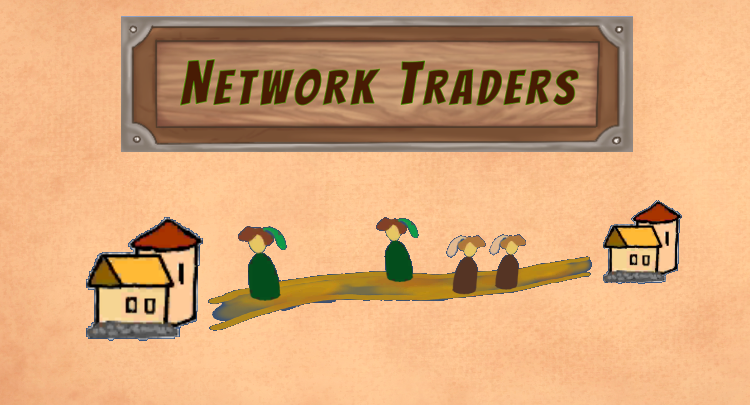If you have followed my DevBlog, you know that my current game project Network Traders is about directly trading with your fellow players. “Directly” as in “personally” or “face-to-face”, i.e., being in the same room. This is achieved by using Bluetooth to connect the players’ mobile devices. But how does the core game loop actually look like? Read this story about agents, money, and the pandemic to learn more about the idea behind the game!
Have you ever heard of the “Where’s George?” website? It’s a fascinating project that’s been online since 1998. You enter the serial number of a dollar bill and your location, and if you are lucky, you will see the places it has been before. It may even have travelled over a whole continent, being passed on from hand to hand. This makes you realise how far-flung and intricate the net of human interactions and relationships is. And even after more than 20 years, there are still thousands of people using the website every day.
The idea behind “Where’s George?” has intrigued me for a long time. But it was the development of contact tracing apps during the Covid pandemic that provided the essential piece of my idea’s mosaic. By simply being close to someone else’s smartphone the Corona app logs a connection. In principal, you would thus get a network of people’s connections very quickly (but fortunately it’s forbidden to collect such data without consent for reasons of privacy protection).
Travelling Agents
The Corona tracing network stays hidden to the users. But wouldn’t it be interesting to see where your network of personal relationships reaches to? In order to explore this network in a playful manner, I thought about virtual agents travelling along it’s edges. An agent, in software development, is a little program with a certain behaviour that may interact with other agents of its kind and its environment.
In Network Traders, the agents are called “merchants”. By connecting to another player’s device, a merchant of yours may travel to this device. This is called “trading”. From there, the merchant decides for itself what it will do next. When the device it is on connects to yet another device, it may pass over to it, or may wait for a chance to come back to you. Eventually, it may return to you and give you an account of its voyage. Thereby, you gain more information about your personal network of traders.
To make things more interesting, merchants not only hop from one device to the next, they also carry goods and exchange them with those of other players. When their journey is over and they return to you, you get all those goods they carry with them. These newly traded goods can then be used to upgrade your abilities by constructing new buildings in your merchants’ home town on your device.
Your Feedback is Welcome!
This is, of course, just a rough sketch of the basic idea behind Network Traders. I will follow up this post with more in-depth information about the game and its features. In the meantime: what were your thoughts when you read about this idea? I am curious to know if it sounds interesting to you, for someday – soon, hopefully – I would like to invite you to test a first version of the game. Please leave a comment below!
And as always, follow me on Twitter to get the latest information about Network Traders!

